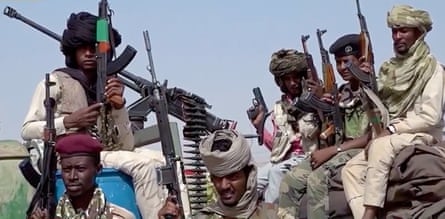As Sudan’s brutal civil war rages on, the humanitarian situation in the key Darfuri city of El-Fasher has reached alarming new levels. The city, once a vital hub in western Sudan, has now fallen under the control of the Rapid Support Forces (RSF) after a prolonged and devastating siege that lasted nearly a year and a half.
The takeover has sparked global concern and warnings of potential mass killings as thousands of civilians remain trapped without food, communication, or medical aid. Witnesses describe scenes of horror — homes burned, families separated, and neighborhoods emptied by fear.
A City Engulfed by Violence
El-Fasher had stood as one of the last strongholds of the Sudanese Armed Forces (SAF) in the Darfur region. Its fall marks a major turning point in the country’s ongoing power struggle between Gen Abdel Fattah al-Burhan, head of the Sudanese military, and Mohamed Hamdan Dagalo, commonly known as Hemedti, leader of the RSF.
After months of heavy shelling and ground attacks, the Sudanese army confirmed on Monday that its forces had withdrawn. In a televised speech, Gen Burhan said the retreat was a “necessary step” to prevent further civilian casualties amid what he called the “systematic destruction and mass killing” of innocent people.
International monitors, including the United Nations and Yale University’s Humanitarian Research Lab, have since reported credible evidence of atrocities. Satellite images analyzed by Yale researchers allegedly reveal mass graves, bodies lined along streets, and pools of blood — chilling signs of what may be one of the worst massacres in Sudan’s modern history.
Civilians Trapped, Communications Cut
For months, El-Fasher’s residents endured extreme shortages of food and water as RSF fighters encircled the city. Medical supplies ran out, and humanitarian convoys were unable to reach the area due to continued fighting.
Now, with the city fully under militia control, survivors say they have lost all contact with their relatives who stayed behind. One displaced resident, who fled to a nearby camp, told the BBC that several members of his family were “gathered and killed” by RSF fighters.
“We can’t reach anyone. The phones don’t work, the lines are dead. My family is gone — all of them,” he said, his voice breaking.
Reports suggest that hundreds of thousands of civilians remain trapped inside the city, facing hunger, disease, and targeted violence. Many fear that the atrocities committed in other parts of Darfur — including ethnically motivated killings — are being repeated on a larger scale in El-Fasher.
Witnesses Describe ‘Unimaginable Horror’
Nathaniel Raymond, executive director of Yale’s Humanitarian Research Lab, described the ongoing situation as “unlike anything I’ve ever seen in a quarter century of this work.” He said new satellite images show not only mass executions but also evidence of people being shot by snipers while trying to flee through gaps in the city’s perimeter walls.
A UN humanitarian team operating in Sudan said they were “deeply horrified” by credible accounts of sexual violence, house-to-house raids, and attacks on civilians attempting to escape.
According to local Darfuri armed groups aligned with the army — known collectively as the Joint Force — at least 2,000 civilians may have been killed since the RSF seized control. However, the number cannot be independently verified due to the communication blackout and lack of access for journalists and aid agencies.
Health Facilities Targeted Amid Chaos
The World Health Organization (WHO) reported that the city’s last partially functioning hospital came under attack over the weekend. A nurse was killed during the assault, and the facility sustained serious damage, leaving it barely operational.
Humanitarian organizations say the deliberate targeting of hospitals and medical workers is a clear violation of international humanitarian law. With healthcare infrastructure collapsing, even treatable wounds and infections have turned deadly.
International Community Urges Action
Global leaders and human rights organizations have called for an immediate end to the violence. The European Union urged all warring factions to “de-escalate immediately,” while the African Union issued a strong condemnation of what it described as “ethnically targeted killings and war crimes.”
UN Secretary-General Antonio Guterres said he was “gravely concerned” about the deteriorating situation and demanded that all parties respect international law and allow humanitarian aid to reach those in need.
Despite these appeals, many Sudanese civilians say the world’s response has been far too slow. Gen Burhan himself accused the international community of turning a blind eye to the atrocities, vowing to continue the fight “until every inch of Sudan is freed from traitors.”
“We will turn the tables and reclaim every land that has been desecrated,” Burhan declared in his speech, reflecting the deep anger and determination that has come to define Sudan’s fractured leadership.
A Nation on the Brink
Sudan’s civil war, which erupted in April 2023, has already displaced more than 12 million people and created one of the world’s worst humanitarian crises. Towns have been razed, millions face starvation, and aid groups say Darfur is teetering on the edge of genocide.
The fall of El-Fasher has intensified fears that the conflict could further fragment the country, igniting ethnic tensions and drawing in regional militias. Analysts warn that without immediate international intervention, the death toll could rise dramatically in the coming weeks.
For the families still trapped inside the besieged city, the future remains uncertain — and the silence from the outside world grows more deafening by the day.
Conclusion
El-Fasher’s fall is more than a military setback; it is a humanitarian catastrophe that reveals the brutal cost of Sudan’s civil war. With communications cut, hospitals destroyed, and aid blocked, thousands of innocent lives hang in the balance. As the world debates, the people of Sudan continue to pay the ultimate price — caught between rival forces and forgotten by peace.

